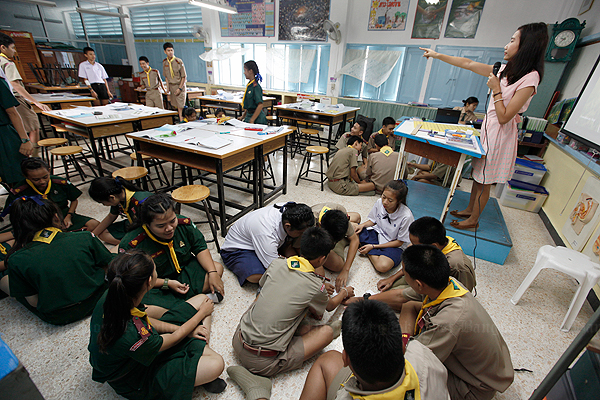
Photos courtesy of Bangkok Post
Educational authorities plan to reduce class hours in state schools next semester. However, some academics are worried that students with poor grades would suffer and need extra tuition.
Read the following story from the Bangkok Post to learn more about the changes.
Students with poor grades may need extra tuition when classes in state schools are cut by two hours in November, warned Anusorn Siwakul, president of the Tutorial Schools Executives and Teachers Association.
CLASS PROBLEMS
While Thai students spent more hours in school compared to those in other countries, their Ordinary National Education Test (O-NET) results showed their academic performance was still below satisfactory, Anusorn said. If students have fewer classes, their performance might become even worse, he warned.
Students with poor grades could also be left behind if they don't take special tutorial courses after school to improve their performance, Anusorn said.
Anusorn suggested state schools under the class reduction project should instead reduce the hours of less important subjects, while increasing the hours of major subjects.
VAGUE POLICY
Tutorial schools were now waiting for a clear statement from the Education Ministry on whether students would be allowed to leave schools at 2pm, or join elective classes until 4pm, he said. The schools were ready to readjust their timetables according to the new school schedule.
Earlier reports said students would have to attend extra-curricular classes after school finishes at 2pm next term. However, the ministry's policy on whether all students have to remain in school until 4pm has not yet been finalised.
MONEY-SPINNER
According to the Office of the Private Education Commission, 2,379 tutorial schools are registered with the Education Ministry. Some 200,000 students attend them to prepare for competitive entrance examinations to top schools and universities.
The tutorial school business in Thailand is worth nearly 10 billion baht a year. Each student using a tutorial service pays about 5,700 baht per year on average in Bangkok, and about 3,900 baht elsewhere.
CRITICAL THINKING
Varakorn Samakoses, president of Dhurakij Pundit University, said the Ministry of Education should focus on developing critical thinking among students and improving teaching methods to encourage students to pay attention in class, instead of reducing classroom hours. This would improve students' performance, he said.
"The ministry should deal with inequality in the education system, as many schools in Bangkok have 2,000-4,500 enrolled students, while most schools in rural areas only have on average 200 enrolled students," Varakorn added.

Exercises
Read the story and decide whether the following statements are true or false.
1. Varakorn Samakoses is president of Dhurakij Pundit University.
……………….
2. O-NET stands for Ordinary National Education Test.
……………….
3. Anusorn Siwakul said students with good grades may need extra tuition when classes in state schools are cut by two hours.
……………….
4. Varakorn Samakoses said the Ministry of Education should focus on reducing critical thinking among students.
……………….
Vocabulary
- elective (adj): (of a course or subject) that a student can choose
extra-curricular (adj): not part of the usual course of work or studies at a school or college
inequality (n): the unfair difference between groups of people in society, when some have more wealth, status or opportunities than others


